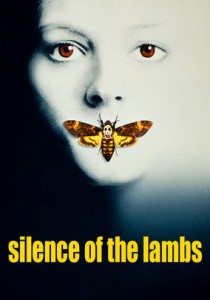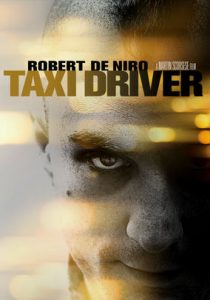The Silence of the Lambs-1991
Director Jonathan Demme
Starring Anthony Hopkins, Jodie Foster
Top 250 Films #64
Top 40 Horror Films #15
Scott’s Review #320
Reviewed January 3, 2016
Grade: A
The Silence of the Lambs (1991) has the honorary achievement of being one of only three films to win the top five Oscar statuettes, having been awarded Best Picture, Best Director (Jonathan Demme), Best Adapted Screenplay, Best Actor (Anthony Hopkins), and Best Actress (Jodie Foster) at the 1991 Oscar ceremonies.
This is no small feat, especially considering the film was released in March (not an Oscar-happy month) and is a horror film. These elements speak volumes for the level of mastery that is The Silence of the Lambs and the film holds up incredibly well as the years go by.
The film was a sleeper hit at the time of release and gradually built momentum throughout the year, becoming a phenomenon and forever a classic.
The film is adapted from the novel of the same name- written by Thomas Harris and, despite being a horror film, contains little gore. The film stars Foster as Clarice Starling, an FBI trainee, sent by her superiors to interview the infamous Hannibal Lecter.
Hannibal, “The Cannibal”, is a highly intelligent former psychiatrist who has been banished to a maximum security insane asylum after having been found guilty of killing and eating his victims.
The FBI hopes that Hannibal will aid them in a current case involving “Buffalo Bill”, a serial killer who skins his female victims.
Hannibal and Clarice embark on an intense and strange relationship in which he gets under her skin and questions her unhappy childhood in exchange for information about “Buffalo Bill”.
This relationship leaves Clarice vulnerable, though the pair develop a strong connection. As Hannibal makes more and more demands in exchange for information, he eventually escapes from custody and a chilling and bizarre escape.
The psychological elements and the intense relationship between Hannibal and Clarice are of monumental importance and Hopkins and Foster share an amazing chemistry.
Hopkins gives a top-notch and downright creepy performance as the cannibalistic killer. His mannerisms are stiff and calculating, his tone of voice monotone, and he simply embodies his character, making him a legendary and recognizable presence in film history.
Two memorable lines that he utters are, “I do wish we could chat longer, but I am having an old friend for dinner.”, and “I ate his liver with some fava beans and a nice Chianti”.
The character of “Buffalo Bill” is as terrifying as Hannibal Lecter.
Portrayed by Ted Levine, the character is maniacal, sexually confused, and otherwise downtrodden. A tailor, he aspires to make a full “woman suit” costume out of his victim’s skin. His current hostage, a Senator’s daughter, is kept confined in an old well and terrorized by Bill’s antics.
His famous line, “It puts the lotion on or it gets the hose again” still terrifies me.
Highly influential, mimicked for years to come, and containing multiple lines and characters permanently etched in film history, The Silence of The Lambs (1991) is a classic not soon forgotten.
The film was followed by multiple sequels, none of which come close to the power and psychological complexities of the original.
Oscar Nominations: 5 wins-Best Picture (won), Best Director-Jonathan Demme (won), Best Actor-Anthony Hopkins (won), Best Actress-Jodie Foster (won), Best Screenplay Based on Material Previously Produced or Published (won), Best Sound, Best Film Editing


